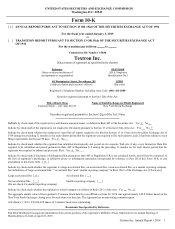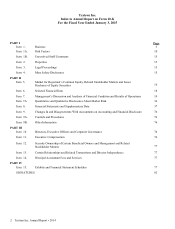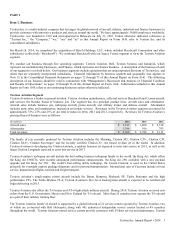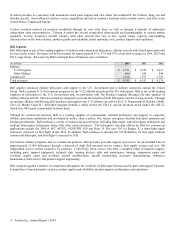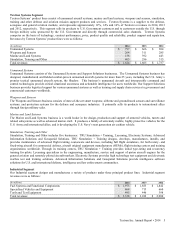E-Z-GO 2014 Annual Report Download - page 17
Download and view the complete annual report
Please find page 17 of the 2014 E-Z-GO annual report below. You can navigate through the pages in the report by either clicking on the pages listed below, or by using the keyword search tool below to find specific information within the annual report.associated materials. A number of our U.S. Government contracts contain provisions that require us to make disclosure to the
Inspector General of the agency that is our customer if we have credible evidence that we have violated U.S. criminal laws
involving fraud, conflict of interest, or bribery; the U.S. civil False Claims Act; or received a significant overpayment under a U.S.
Government contract. Failure to properly and timely make disclosures under these provisions may result in a termination for
default or cause, suspension and/or debarment, and potential fines.
As a U.S. Government contractor, our businesses and systems are subject to audit and review by the Defense Contract Audit
Agency (DCAA) and the Defense Contract Management Agency (DCMA).
We operate in a highly regulated environment and are routinely audited and reviewed by the U.S. Government and its agencies
such as DCAA and DCMA. These agencies review our performance under contracts, our cost structure and our compliance with
laws and regulations applicable to U.S. Government contractors. The systems that are subject to review include, but are not limited
to, our accounting, estimating, material management and accounting, earned value management, purchasing and government
property systems. If an audit uncovers improper or illegal activities we may be subject to civil and criminal penalties and
administrative sanctions that may include the termination of our contracts, forfeiture of profits, suspension of payments, fines, and,
under certain circumstances, suspension or debarment from future contracts for a period of time. Whether or not illegal activities
are alleged, the U.S. Government also has the ability to decrease or withhold certain payments when it deems systems subject to its
review to be inadequate. These laws and regulations affect how we conduct business with our government customers and, in some
instances, impose added costs on our business.
Cost overruns on U.S. Government contracts could subject us to losses or adversely affect our future business.
Under fixed-price contracts, as a general rule, we receive a fixed price irrespective of the actual costs we incur, and, consequently,
any costs in excess of the fixed price are absorbed by us. Changes in underlying assumptions, circumstances or estimates used in
developing the pricing for such contracts may adversely affect our results of operations. Additionally, U.S. Government
procurement policies increasingly favor fixed-price incentive-based fee arrangements rather than traditional fixed-price contracts;
these fee arrangements could negatively impact our profitability. Other current U.S. Government policies could negatively impact
our working capital and cash flow. For example, the government has expressed a preference for requiring progress payments rather
than performance based payments on new fixed-price contracts, which if implemented, delays our ability to recover a significant
amount of costs incurred on a contract and thus affects the timing of our cash flows. Under time and materials contracts, we are
paid for labor at negotiated hourly billing rates and for certain expenses. Under cost-reimbursement contracts that are subject to a
contract-ceiling amount, we are reimbursed for allowable costs and paid a fee, which may be fixed or performance based,
however, if our costs exceed the contract ceiling or are not allowable under the provisions of the contract or applicable regulations,
we may not be able to obtain reimbursement for all such costs. Under each type of contract, if we are unable to control costs
incurred in performing under the contract, our cash flows, results of operations and financial condition could be adversely affected.
Cost overruns also may adversely affect our ability to sustain existing programs and obtain future contract awards.
Demand for our aircraft products is cyclical and could adversely affect our financial results.
Demand for business jets, turbo props and commercial helicopters has been cyclical and difficult to forecast. Therefore, future
demand for these products could be significantly and unexpectedly less than anticipated and/or less than previous period deliveries.
Similarly, there is uncertainty as to when or whether our existing commercial backlog for aircraft products will convert to revenues
as the conversion depends on production capacity, customer needs and credit availability. Changes in economic conditions may
cause customers to request that firm orders be rescheduled or cancelled. Reduced demand for our aircraft products or delays or
cancellations of orders could result in a material adverse effect on our cash flows, results of operations and financial condition.
We may make acquisitions that increase the risks of our business.
We may enter into acquisitions in an effort to expand our business and enhance shareholder value. Acquisitions involve risks and
uncertainties that could result in our not achieving expected benefits. Such risks include difficulties in integrating newly acquired
businesses and operations in an efficient and cost-effective manner; challenges in achieving expected strategic objectives, cost
savings and other benefits; the risk that the acquired businesses’ markets do not evolve as anticipated and that the acquired
businesses’ products and technologies do not prove to be those needed to be successful in those markets; the risk that our due
diligence reviews of the acquired business do not identify or adequately assess all of the material issues which impact valuation of
the business or that may result in costs or liabilities in excess of what we anticipated; the risk that we pay a purchase price that
exceeds what the future results of operations would have merited; the risk that the acquired business may have significant internal
control deficiencies or exposure to regulatory sanctions; and the potential loss of key customers, suppliers and employees of the
acquired businesses. In addition, unanticipated delays or difficulties in effecting acquisitions may prevent the consummation of
the acquisition or divert the attention of our management and resources from our existing operations.
If our Finance segment is unable to maintain portfolio credit quality, our financial performance could be adversely affected.
A key determinant of the financial performance of our Finance segment is the quality of loans, leases and other assets in its
portfolio. Portfolio quality may be adversely affected by several factors, including finance receivable underwriting procedures,
11 Textron Inc. Annual Report • 2014


